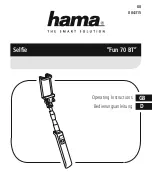
1.3 Release the left rear fastening flap from the support fixed to the inner shell by
slightly deforming the shell sealing edge and slightly pulling the comfort padding
in the helmet neck-ring area towards the inside (Fig. 14).
Then repeat the same steps to remove the central flap as well as the right
rear flap.
1.4 Hold the left front part of the liner and pull it upwards in order to remove the liner
flap from the support fixed to the inner polystyrene shell (Fig. 15). Repeat the
same steps to remove the central and right front flap.
1.5 Completely remove the liner from the helmet.
2 ASSEMBLY
2.1 Insert the liner correctly into the helmet and fit it well against the base.
2.2 Insert the left front flap into the seat on the support fixed to the polystyrene inner
shell and push it slightly downwards until it is completely locked (Fig. 15). Follow
the same steps for the central and right front flap.
2.3 Insert the rear right, central and left flaps of the liner into the relevant support
seats in the helmet neck-ring area (Fig. 14). To perform this step, act as follows:
slightly deform the shell sealing edge and push the flaps until they are complete-
ly hooked to the support.
2.4 Hook the roll-neck eyelet to the frame fixed to the outer shell (Fig. 13), making
sure that the frame central hole is free.
Note: Check the correct assembly of the liner front area by lifting and lowering
the VPS. These movements should be smooth. If this is not the case, repeat the
steps 1.4 and 2.2.
2.5 Insert the left chin strap in the left cheek pad slot by pulling it towards the inside
of the helmet; then press the padding onto the snap fastener on the back of the
helmet so that it is hooked in the hooking seat of the frame fixed to the shell (Fig. 12),
put aside the roll-neck flap (Fig. 11).
WARNING!!!
-
Remove the padding only when cleaning or washing is required.
- Never use the helmet if the inner comfort padding and the cheek pads have not
been correctly and completely restored.
-
Delicately hand-wash in lukewarm water (max. 30°C) and neutral soap.
-
Rinse off with cold water and dry up at room temperature away from direct sunrays.
-
Never machine-wash the inner comfort padding.
-
The inner polystyrene is an easily deformable material, in fact it is apt to change
or get partially destroyed to help absorb shocks.
- Use a wet cloth to clean it and let it dry at room temperature away from direct
sunrays.
-
Do not modify the helmet's internal polystyrene components in any way.
-
Never use tools or equipment of any sort to carry out the steps described above.
18
Summary of Contents for N43E AIR
Page 82: ...82...
Page 83: ...83 E v...
Page 84: ...84 N 43 E AIR 1 1A 90 1 B 2 A 2 3 4 B C 3 1 C B 3 2 A 2 3 90 1 4 Nolan 1 1 2 4 JET...
Page 88: ...88 1 4 14 1 5 2 2 1 2 2 15 2 3 14 2 4 13 VPS 1 4 2 2 2 5 12 11 30 C max...
Page 89: ...89 1 1 2 3 4 2 D 16 3 D 17 4 2 3 R L 1 1 2 3 4 2 C B 18 3 A 19 4 90 20 1 5 Nolan 1 1A 90 1 B...
Page 91: ...91 2 PINLOCK 2 1 Pinlock 2 2 Pinlock 24 2 3 Pinlock 24 25 A B B...
Page 92: ...Fig 4 Fig 5 Fig 6 Fig 7A Fig 7B Fig 1B Fig 1A Fig 2 Fig 3 A B C...
Page 93: ...Fig 11 Fig 12 Fig 15 Fig 13 Fig 14 Fig 8 Fig 9 Fig 10...
Page 94: ...MIN MAX Fig 18 Fig 19 Fig 21 Fig 22 Fig 23 Fig 16 D D Fig 17 D C B A Fig 20...
Page 95: ...Fig 24 Fig 25 A B A B C D E F...
















































